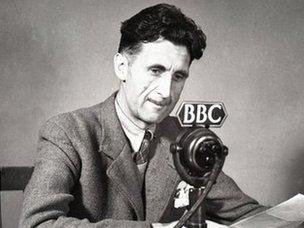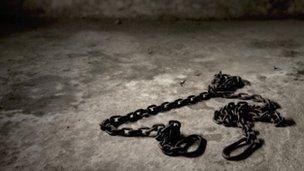George Orwell family among 3,000 slave-owners who received compensation
- Published

The family of 1984 author George Orwell are among those to have received compensation
Author George Orwell's ancestors were one of 3,000 slave-owning families paid a total of £20m (£1.8bn in today's prices) in compensation when slavery was abolished, research suggests.
Compensation was paid in 1833 to his great-great-grandfather's trustees.
Details of the payments are published by University College London (UCL) as part of a new searchable database., external
The ancestors of novelist Graham Greene and architect Sir George Gilbert Scott also owned slaves, researchers found.
The database is open to the public and allows anyone to find out details of the families involved in slavery in the Caribbean; Mauritius; and the Cape Colony (part of modern-day South Africa).
According to ship records it is estimated around 12.5 million people were transported as slaves from Africa to the Americas and the Caribbean from the 16th century until the trade was banned in 1807.
Ownership of slaves was outlawed in the British Empire in 1833.
Colonial networks
Orwell's real name was Eric Blair and he was descended from Charles Blair, a Scot who made a fortune in Jamaica before marrying into the English aristocracy.
UCL found compensation was paid to "trustees of Charles Blair", for the 218 enslaved people on the family's East Prospect estate, at St Thomas-in-the-East in Jamaica.
Professor Catherine Hall, the leader of the project and professor of modern British social and cultural history at UCL, said the project has taken three years.
She told BBC Radio 4's Today programme: "Slavery has been forgotten in conventional British history. What's been remembered is abolition rather than the slave trade, and extraordinarily many people do not know about Britain's colonial past in relation to slavery.
"The most surprising thing is how embedded the whole slavery business is in British society.
"One of the things we found is that far from the slave owners all being concentrated in the great slaving ports of London, Liverpool, Glasgow and Bristol, there are people all over the country making claims of compensation."
Prof Hall said it was "very striking" how many slave owners there were in Scotland.
"The empire offered opportunities to the Scots on a very significant scale and working on the plantations was a favoured choice for Scots seeking their fortunes in the late 18th and early 19th century," she said.
Other famous names who were distantly related to people involved in the slave trade include the Prime Minister, David Cameron; Arts Council chairman Sir Peter Bazalgette; and the celebrity chef Ainsley Harriott.
Most of the slave owners were men, but researchers found many women were also involved, particularly in the Caribbean.
Prof Hall said: "Nearly all of them were small scale though. There are very few wealthy women, because married women had great difficulty in holding any property, so it's single women and widows for the most part."
One of the female slave owners was a widow, Hannah Barnes of Barton Cottage in Dawlish, Devon.
She had an annuity of £400 secured on the Cumberland estate in Jamaica, as well as owning nine slaves in the island's capital, Kingston.

Around 12.5 million people were transported across the Atlantic as slaves before 1807
In November 1835 she told the Commissioners of Slave Compensation: "[M]yself, my daughter and her children are entirely dependent for support on what we receive from [my late husband's] Estate; that in consequence of the non-receipt of our remittances for many months past, I am much in want of money."
Prof Hall said: "Our overall finding is that British colonial slave-ownership was of far greater significance in Britain than has previously been recognised.
"What we have done is to establish the life-trajectories of some 3,000 absentee slave-owners in Britain, and analysis of this has allowed us to trace the legacies of slave-ownership in Victorian Britain."
Her colleague on the team, Dr Nick Draper, said: "By looking systematically at estate ownership in the British Caribbean during the last 70 years of slavery we will be able to assess slave-ownership's national significance at the height of the slave system. At the same time we plan to integrate the histories of the enslaved men and women into the histories of the estates on which they lived and worked."